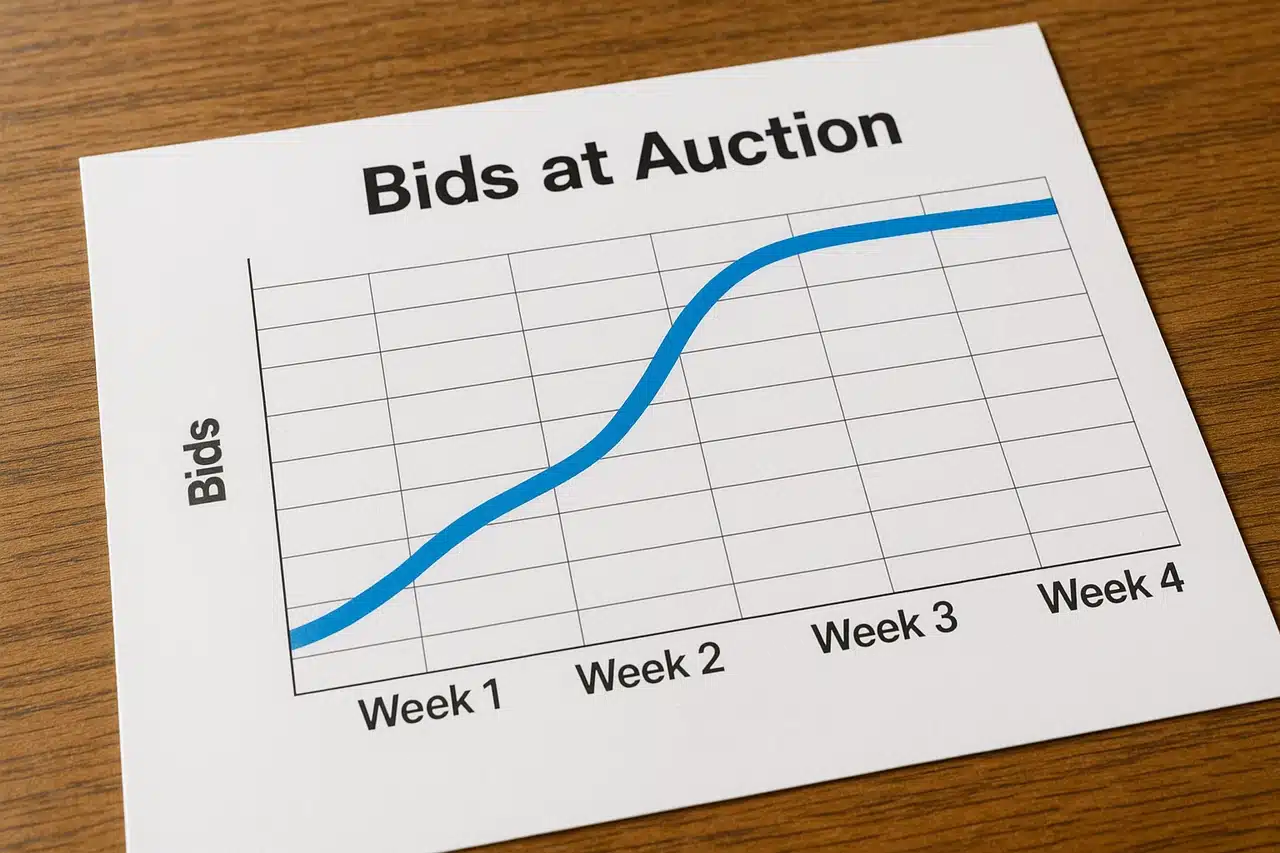Sell Your Home Hassle-Free by Extended Auction
- Cost effective
No upfront fee & sell for free options - Quick
Sell your property in as little as 28 days - Secure & reliable
Legally binding sale on auction day - Fair & transparent
Sold to the highest bidder
For your peace of mind we are a member of The Property Ombudsman


Selling by auction is quick and easy. Request a no-obligation auction sale estimate for your house or flat.
- ✔ Reliable
- ✔ Fast
- ✔ Secure
Interested to learn more about the easy and efficient process of selling your house by auction?
Talk to our team on 0800 862 0206
Why sell your home by extended auction?
Auctions address many of the shortcomings of selling through an estate agent. In England and Wales, buyers can legally reduce their offer at the last minute or pull out of the sale altogether – a key reason why many estate agency sales fall through. (The legal process differs in Scotland.)
Auctions, by contrast, offer greater certainty. Competing buyers bid for your property, and the sale becomes legally binding on the fall of the hammer, with contracts exchanged immediately. The extended auction has the same fundamental rules as a traditional “on-the-day” auction, but the timescales are different.
- Auction buyers must carry out their due diligence and have their finances in place before bidding.
- All interested parties are free to bid – no buyer is excluded.
- Auction promotes competitive bidding among serious purchasers, leading to a legally binding sale on auction day.
SAVE COSTS
No upfront costs
Selling your home at auction can be a highly cost-effective option – helping you minimise expenses while maximising your return.
- No upfront costs
- Option to pass your costs to the buyer
- Only pay your solicitor’s fee
Auction is the method of choice for many profit-focused organisations – because it delivers results. Request your free, no-obligation auction sale estimate today.


Sell with peace of mind
Selling your property at auction provides a level of transparency rarely found in private treaty sales. The process is open to all – with no exclusions – allowing multiple interested buyers to compete openly. This creates a fair and competitive environment where bids are made in real time, giving you complete visibility and control over the outcome.
Instead of relying on a single private offer, you let genuine market demand reveal your property’s true value
SECURE
Legally binding
If you’ve tried selling through an estate agent before, you’ll likely be familiar with one of the most common frustrations – sales frequently fall through. Whether it’s buyers pulling out, mortgage complications, or delays during conveyancing, the process can quickly become stressful, time-consuming, and expensive.
That’s why more sellers are choosing auction as a more secure and reliable alternative. At auction, once the hammer falls, the sale is legally binding – giving you the confidence and certainty that the transaction will proceed.

How is an extended auction different to an on-the-day auction?
The traditional “homes under the hammer” style auctions, that are held “on the day”, don’t suit everyone’s circumstances or property type. If you need to be sure of achieving a higher sale price, you might like to consider an extended auction.
An extended auction works much like a very efficient version of an estate agency sale, but with the added security of auction terms. Once a bid is accepted, the sale is unconditional and legally binding – the buyer can’t withdraw or reduce their offer. Just like a traditional on-the-day auction, it offers a high level of certainty, but with three key advantages that can help drive up the final sale price even further. These added benefits make extended auctions a powerful alternative for sellers seeking both reliability and maximum value.
- More time
Extended bidding period allows for more bids - Flexibility
Change the auction end date, to ensure a successful sale - Higher price
Reserve prices are usually set higher
Discover the benefits of selling your home via extended auction. Enjoy more flexibility, a wider pool of buyers, and a legally binding sale – all with a higher reserve price and no upfront fees.
TIME
Longer bidding period
With an extended auction, buyers have weeks – not just minutes – to place their bids, eliminating the risk of missing out on auction day. This longer timeframe attracts a wider pool of potential buyers, not just seasoned investors but also end-users who are often willing to pay more.
The added time and flexibility make the process more accessible and appealing, giving serious buyers the confidence to engage – and giving you the best chance of achieving a strong sale price.


FLEXIBLE
More control
An extended auction gives you greater flexibility and control over the sale. You can choose when to start the auction and, if needed, extend the end date to allow more time for buyer interest and bidding activity.
Unlike an on-the-day auction with fixed timings, you’re not locked in. If a strong offer comes in during the auction period, the auctioneer can trigger a run-off period – giving other interested buyers a final chance to bid – and bring the auction to an early close. This adaptable approach increases your chances of securing the best possible outcome.
PRICE
Higher reserve price
With an extended auction, sellers can often set a higher reserve price – the minimum price you’re willing to accept for your property. This provides greater protection, as the property won’t sell unless bidding reaches or exceeds that amount.
Compared to traditional on-the-day auctions, extended auctions are generally more flexible and willing to accommodate higher reserves, reducing the risk of underselling. This added security allows sellers to aim for stronger outcomes without compromising on certainty, making it an appealing option for those looking to maximise value while staying in control.

Everything You Need to Know – Selling a Property by Extended Auction
Please note: Terms of business vary between auctioneers. The guidance below is intended to provide a general outline of how the process works. Always check specifics directly with your chosen auction company.
Unlike a traditional on-the-day auction, where bidding happens in just a few minutes on one day, an extended auction runs online over the course of a month (or longer if needed). This format gives buyers more time to view, research and bid, which typically broadens the audience and can help achieve a higher final sale price.
How long does the auction last?
Extended auctions usually run for 1–3 months, in rolling monthly cycles until the property is sold (exchange of contracts / a legally binding sale).
In some cases, sales happen very quickly – even within a week – if the reserve price is set low. But in most situations, expect 1–2 months from start to finish.
At the close of the auction, contracts are exchanged (a legally binding sale). Completion then takes place 4 weeks later (sometimes extended to 6 or 8 weeks if agreed at the outset). Once the hammer falls, the completion date cannot be changed.
Who sets the reserve price?
The reserve price is the lowest amount your property can sell for. It’s your bottom line, or “safety net”.
- The reserve must be realistic to ensure a sale within the auction period.
- A typical reserve is around 10% below market value for an extended auction.
- The auctioneer has the final say. If your expectations are too high, they won’t list the property.
Once set, the property cannot sell for less than the agreed reserve price.
Can the reserve price be adjusted?
Yes, but only by agreement between you and the auctioneer.
If bidding ends below the reserve price, the auctioneer will usually give you two options:
- Reduce the reserve to match the top bid and exchange contracts.
- Roll the auction on for longer, giving more time to attract new bidders.
This flexibility is a key difference from on-the-day auctions, where a property is marked “unsold” if bidding falls short, often losing momentum.
How long is the contract with the auctioneer?
Typically 2 months plus a 1-month notice period.
If unsold after 2 months, you can serve notice for a final third month. If it still hasn’t sold, you can withdraw – or simply continue rolling it forward month by month.
How much does it cost to sell?
With an extended auction, the buyer pays the fees.
-
The buyer pays a premium of 3.75% to 5% + VAT (depending on geographic location) subject to a £6,000+VAT minimum.
-
The seller pays no commission and usually no upfront fees.
-
Your only cost is your solicitor’s fees (including the cost for preparing the legal pack: typically £300–£600).
Some auctioneers will even defer legal pack costs until the property sells.
What amount will I receive from the sale?
You’ll receive the full hammer price (final bid), with no deductions apart from your solicitor’s fees.
Example: If the reserve was £300,000 and bidding reached £325,000, you receive the full £325,000.
What happens if my property doesn’t sell?
Auctioneers aim for around 80% success.
-
Traditional auctions achieve this by setting very low reserves.
-
Extended auctions can set reserves higher, as the longer timeframe allows for more buyers to participate.
Success still depends heavily on market conditions and pricing.
If your property doesn’t sell within 2 months you can serve notice and withdraw after 3 months. Alternatively, you can continue rolling it forward until it does sell.
How often do properties sell above reserve?
It varies. Sometimes bidding exceeds the reserve significantly – especially if the guide price is set attractively.
However, you should always be prepared to sell at the reserve price. The main benefit of auction is the certainty of a legally binding sale, not necessarily a bidding war.
Who does the viewings?
The auctioneer will usually appoint a local partner estate agent to conduct viewings.
Viewings matter: while some buyers bid without seeing the property, the strongest bids generally come from those who have visited in person.
Can I keep my estate agent involved?
No. Auctioneers require exclusivity.
However, they will appoint a local estate agent from their panel to help with marketing and viewings – working with the auctioneer, not against them.
Do I need a solicitor?
Yes. A solicitor prepares the auction legal pack and handles the legal side of the sale.
You can use your own solicitor or one recommended by the auctioneer.
How do buyers bid?
Almost all auctions (including extended and on-the-day) are now online.
-
Buyers must register, verify ID and sign a bidder agreement.
-
They can bid at any time during the auction period.
-
If they’re outbid, they’re notified and can increase their offer.
-
Near the deadline, bidding often becomes lively, with the timer extending by 15 minutes each time a new bid is placed.
Why not just reduce the asking price with my estate agent?
Reducing your estate agent’s asking price can generate interest, but once you accept one offer, all other buyers are turned away. You’re reliant on one buyer, who may later reduce their offer or withdraw entirely.
With auction, all buyers remain in play until the end. They must do their research before bidding, so once they bid, they’re committed. When the hammer falls, contracts are exchanged immediately.
In short: with estate agents, the buyer does their due diligence after offering. With auction, they do it before offering.
What research do buyers carry out before bidding?
Because the sale is legally binding, buyers are expected to know everything about the property before bidding.
This means reviewing the auction legal pack (title deeds, searches, property forms, etc.), arranging viewings, surveys, and raising any queries with the auctioneer.
What price will my property be advertised for?
Auctioneers market properties at a guide price, often lower than the reserve, to stimulate interest.
- The guide price is typically within 10% of the reserve.
- It cannot be misleadingly low, but it’s set attractively to encourage competitive bidding.
Remember: the property cannot sell below the reserve, regardless of the guide price.
Is the sale legally binding?
Yes – provided you’re using an unconditional auction.
On the fall of the hammer:
-
Contracts are exchanged.
-
The buyer pays 5% exchange deposit + the buyer’s premium.
Be aware: some auctioneers run conditional auctions, where the sale is not binding. Instead, the buyer pays a reservation fee and has 2 months to complete checks – meaning they can still walk away.
Always confirm whether the auction is unconditional or conditional.
Is an Unconditional Extended Auction the Same as the Modern Method of Auction?
No – they are very different. In an unconditional extended auction, contracts are exchanged as soon as bidding ends, so the sale is legally binding on the fall of the hammer.
The modern method of auction (MMoA), however, is a conditional auction. The buyer pays a reservation fee but is not legally committed until contracts are exchanged weeks later. If they pull out, the seller is left without a sale, while the fee goes to the agent or auction company.
For this reason, sellers should exercise caution if considering the modern method of auction, as it does not provide the same speed or certainty as an unconditional extended auction.
Can anyone sell at auction?
Not always. You must be a chain-free seller.
- Vacant properties and tenanted properties are fine.
- If you live there, you must have your onward move ready (e.g. your onward purchase is ready, alternatively; renting or moving in with family).
- You must also be comfortable with the reserve price, as you cannot later refuse to sell if bidding meets it.
Who will the buyer be?
Extended auctions attract a broad mix:
-
Investors, landlords and builders (as with traditional on-the-day auctions).
-
Owner-occupiers (who often pay more, as they’re buying a home, not an investment).
The longer timeframe helps capture these residential buyers, widening demand.
What if a “we buy any house” company offers me more?
Be cautious. Many of these property buying firms act as brokers rather than genuine buyers, and the sale is still subject to the usual private treaty process – meaning they can reduce or withdraw their offer at any stage.
Since the government’s 2024 autumn statement increased stamp duty for such companies, many have struggled to buy directly and now act as middlemen instead.
Can I withdraw from the auction?
Yes, but only before the fall of the hammer.
If you withdraw from auction within the auction period:
- Withdrawal fees are usually £1,000 – £2,000, but some auctioneers charge the full commission.
- Check this carefully in the terms of business.
Also be aware: buyers (or rival agents) may try to persuade you to withdraw and sell directly to them. Auctioneers protect against this by including a clause that ensures if you sell to a buyer they introduced, full commission still applies.
Final Thoughts
Selling by extended auction offers a faster, more secure, and often more competitive route than both traditional on-the-day auctions and estate agents.
The key differences are:
- More time for buyers to participate (1-3 months vs. 2-3 minutes).
- Broader audience, including both investors and homebuyers.
- Greater chance of achieving a higher sale price without sacrificing the security of a legally binding sale.
If you’re chain-free, realistic on price, and looking for a quicker, more certain way to sell, an extended auction is well worth considering.
Contact our team
Considering selling your property at auction?
Give our team a call on 0800 862 0206 – we’ll be happy to chat about whether auction is the right fit for your property and situation.
Prefer to get in touch online? Just click the button below to send us a message.
Request an estimate
If you know the address of the property you’re thinking about selling, the easiest way to get an auction sale price and cost estimate is by requesting a free estimate online.